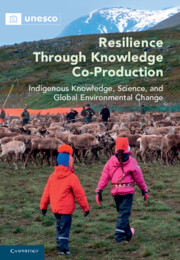 Resilience through Knowledge Co-Production
Resilience through Knowledge Co-Production from Part I - From Practice to Principles
Published online by Cambridge University Press: 02 June 2022
Community-based research can produce many outcomes: from the documentation of knowledge to the connection of different types of knowledge to the true co-production of knowledge. In this chapter, we describe our experiences with two projects that lie along this spectrum. The Bering Sea Project documented local and traditional knowledge about the region’s ecosystem, leading to papers that presented that knowledge, connected it to other ways of understanding the human role in the ecosystem and developed a new understanding of the ways in which ecosystem conditions affect hunting success. The Bidarki Project started as an ecological study of a keystone intertidal grazer and developed into a co-production effort exploring history and culture to explain today’s patterns in intertidal abundance. In both cases, the path towards co-production started with personal relationships and continued by taking advantage of opportunities that arose during the course of each project. Not all community-based projects will result in co-production of knowledge nor is that outcome the only measure of success, but all will benefit from the essential foundations of true collaboration which are mutual respect and intellectual equality.
To save this book to your Kindle, first ensure [email protected] is added to your Approved Personal Document E-mail List under your Personal Document Settings on the Manage Your Content and Devices page of your Amazon account. Then enter the ‘name’ part of your Kindle email address below. Find out more about saving to your Kindle.
Note you can select to save to either the @free.kindle.com or @kindle.com variations. ‘@free.kindle.com’ emails are free but can only be saved to your device when it is connected to wi-fi. ‘@kindle.com’ emails can be delivered even when you are not connected to wi-fi, but note that service fees apply.
Find out more about the Kindle Personal Document Service.
To save content items to your account, please confirm that you agree to abide by our usage policies. If this is the first time you use this feature, you will be asked to authorise Cambridge Core to connect with your account. Find out more about saving content to Dropbox.
To save content items to your account, please confirm that you agree to abide by our usage policies. If this is the first time you use this feature, you will be asked to authorise Cambridge Core to connect with your account. Find out more about saving content to Google Drive.